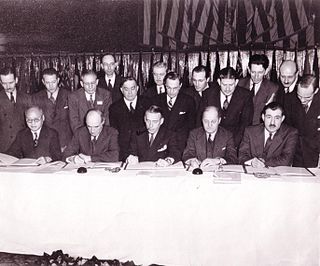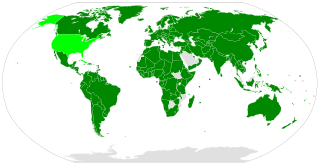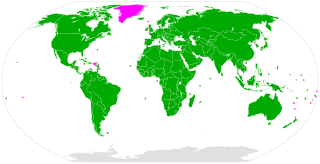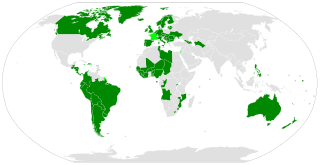| C82 | |
|---|---|
| ILO Convention | |
| Date of adoption | July 11, 1947 |
| Date in force | June 19, 1955 |
| Classification | Economic and Social Policy |
| Subject | Social Policy |
| Previous | Labour Inspection Convention, 1947 |
| Next | Labour Standards (Non-Metropolitan Territories) Convention, 1947 |
Social Policy (Non-Metropolitan Territories) Convention, 1947 is an International Labour Organization Convention.
It was established in 1947 with the preamble stating:
Having decided upon the adoption of certain proposals concerning social policy in non-metropolitan territories,...
As of 2013, the convention has been ratified by four states: Belgium, France, New Zealand, and the United Kingdom.
The Convention on the Prevention and Punishment of the Crime of Genocide (CPPCG), or the Genocide Convention, is an international treaty that criminalizes genocide and obligates state parties to pursue the enforcement of its prohibition. It was the first legal instrument to codify genocide as a crime, and the first human rights treaty unanimously adopted by the United Nations General Assembly, on 9 December 1948, during the third session of the United Nations General Assembly. The Convention entered into force on 12 January 1951 and has 152 state parties as of 2022.

The Convention on International Civil Aviation, also known as the Chicago Convention, established the International Civil Aviation Organization (ICAO), a specialized agency of the United Nations charged with coordinating international air travel. The Convention establishes rules of airspace, aircraft registration and safety, security, and sustainability, and details the rights of the signatories in relation to air travel. The Convention also contains provisions pertaining to taxation.

The International Covenant on Economic, Social and Cultural Rights (ICESCR) is a multilateral treaty adopted by the United Nations General Assembly (GA) on 16 December 1966 through GA. Resolution 2200A (XXI), and came in force from 3 January 1976. It commits its parties to work toward the granting of economic, social, and cultural rights (ESCR) to the Non-Self-Governing and Trust Territories and individuals, including labour rights and the right to health, the right to education, and the right to an adequate standard of living. As of July 2020, the Covenant has 171 parties. A further four countries, including the United States, have signed but not ratified the Covenant.

The Convention Concerning the Prohibition and Immediate Action for the Elimination of the Worst Forms of Child Labour, known in short as the Worst Forms of Child Labour Convention, was adopted by the International Labour Organization (ILO) in 1999 as ILO Convention No 182. It is one of eight ILO fundamental conventions.

The International Convention on the Protection of the Rights of All Migrant Workers and Members of Their Families is a United Nations multilateral treaty governing the protection of migrant workers and families. Signed on 18 December 1990, it entered into force on 1 July 2003 after the threshold of 20 ratifying States was reached in March 2003. The Committee on Migrant Workers (CMW) monitors implementation of the convention, and is one of the seven UN-linked human rights treaty bodies. The convention applies as of October 2022 in 58 countries.
The Freedom of Association and Protection of the Right to Organise Convention (1948) No 87 is an International Labour Organization Convention, and one of eight conventions that form the core of international labour law, as interpreted by the Declaration on Fundamental Principles and Rights at Work.
Labour Standards Convention, 1947 is an International Labour Organization Convention.
The Convention concerning the Right of Association and the Settlement of Labour Disputes in Non-Metropolitan Territories is an International Labour Organization Convention on the rights of workers in non-metropoliton territories to form and be active in labour unions.
Labour Inspectorates Convention, 1947 is an International Labour Organization Convention.
Social Policy Convention, 1962 is an International Labour Organization Convention.
The following outline is provided as an overview of and topical guide to the United Nations:

The Convention on the Reduction of Statelessness is a 1961 United Nations multilateral treaty whereby sovereign states agree to reduce the incidence of statelessness. The Convention was originally intended as a Protocol to the Convention Relating to the Status of Refugees, while the 1954 Convention Relating to the Status of Stateless Persons was adopted to cover stateless persons who are not refugees and therefore not within the scope of the Convention Relating to the Status of Refugees.
The European Convention for the Prevention of Torture and Inhuman or Degrading Treatment or Punishment was adopted by the member states of the Council of Europe, meeting at Strasbourg on 26 November 1987. After the European Convention on Human Rights, the Convention for the Prevention of Torture is widely regarded as being one of the most important of the Council of Europe's treaties. The Convention marks a fresh and preventive approach in handling human rights violations. It was subsequently amended by two Protocols. Additionally, the Committee for the Prevention of Torture was established to comply with the provisions of the convention. This body is enabled to visit any place within the jurisdiction of the states' parties where people are deprived of their liberty in line with the articles of the convention.
C-82 may refer to:
The United States has signed the United Nations Convention on the Rights of the Child (UNCRC); however, it remains the only United Nations member state to have not ratified it.

The Maritime Labour Convention (MLC) is an International Labour Organization (ILO) convention, number 186, established in 2006 as the fourth pillar of international maritime law and embodies "all up-to-date standards of existing international maritime labour Conventions and Recommendations, as well as the fundamental principles to be found in other international labour Conventions". The other pillars are the SOLAS, STCW and MARPOL. The treaties applies to all ships entering the harbours of parties to the treaty (port states), as well as to all ships flying the flag of state party (flag states, as of 2021: over 91 per cent).

The Council of Europe Convention on Preventing and Combating Violence Against Women and Domestic Violence, better known as the Istanbul Convention, is a human rights treaty of the Council of Europe opposing violence against women and domestic violence which was opened for signature on 11 May 2011, in Istanbul, Turkey. The convention aims at prevention of violence, victim protection and to end the impunity of perpetrators. As of March 2019, it has been signed by 45 countries and the European Union. On 12 March 2012, Turkey became the first country to ratify the convention, followed by 37 other countries from 2013 to 2022. The Convention came into force on 1 August 2014. In 2021, Turkey became the first and only country to withdraw from the convention, after denouncing it on 20 March 2021. The convention ceased to be effective in Turkey on 1 July 2021, following its denunciation. On 1 June 2023 the Council of the European Union approved the EU's accession to the Istanbul Convention.

The Convention on Domestic Workers, formally the Convention concerning Decent Work for Domestic Workers is a convention setting labour standards for domestic workers. It is the 189th ILO convention and was adopted during the 100th session of the International Labour Organization, in 16 June 2011. It entered into force on 5 September 2013.
The International Convention for the Suppression of the Traffic in Women and Children is a 1921 multilateral treaty of the League of Nations that addressed the problem of international trafficking of women and children.

The Treaties of the European Union are a set of international treaties between the European Union (EU) member states which sets out the EU's constitutional basis. They establish the various EU institutions together with their remit, procedures and objectives. The EU can only act within the competences granted to it through these treaties and amendment to the treaties requires the agreement and ratification of every single signatory.